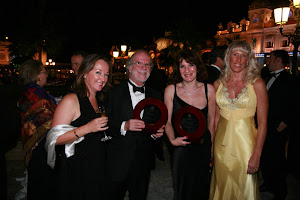
I adore legaltech and the people within it. My career spans media that includes The Times, The Sunday Times, The Financial News, The Legal 500, Legal Business and the late In Brief Magazine (RIP). Now running my own junket - JPC which includes Citytech, I do it because I loves it (very Gollum) not just a little bit but a big bit and although I've worked in many sectors, I rank legaltech as an all time favourite. Why? It’s rammed full of party people, who make the best of life. They share their enthusiasm with everyone and are highly sociable creatures always ready to laugh and tell a joke or cheer everyone up. They can talk for hours about topics that include sentences like “You need ECM, not DM with CRM and BPM.” They are always fighting to put their credit cards down to pay for drinks bills and are the most deeply loyal set of people I have ever met. Karen Jones as herself and Citytech Editor declares her ongoing adoration of legaltech and its wonderful population. Here is what other tech ladies think. Victoria Shortt, PR at Samsung: “I‘ve been working in the tech industry for five years now as a PR consultant and have worked across a broad range of tech clients including Interwoven, O2, Jobsite and now Samsung. I love working in the tech industry because its such a fast paced environment. I enjoy taking dry and sometimes overcomplicated tech stories and making them interesting. DM, ECM and WCM are all great but how do they actually benefit the end-user? That is what is interesting about tech for me – not being bogged down in details or jargon but how technology can actually add value to someone’s working day. The biggest achievement for me is probably taking a former client Interwoven to the number one spot in terms of press coverage – beating some significant names in the business whilst we were at it. I think the reason we did it was that we believed in their products as much as they do – 47 out of the Top 100 law firms can’t be wrong. The best thing about being a woman in the tech world is blowing apart people’s preconceived notions of women in business.” Thereza Snyman, IT Manager, Boodle Hatfield: “I’m an ex South African, ex lawyer, ex property developer, ex industrial relations student, always fashionista, I fell into legal tech after my MSc in Industrial Relations at the LSE... and was desperately looking for a job (in HR). As an ex-lawyer with a fair bit of self-taught tech nouse at that stage (and thanks to my mother's insistence, keyboard skills), the most obvious means of putting cat-food in my cat's bowl was to temp as a legal sec while the job-hunting process followed its painful course. A temp assignment just after the millennium landed me with a small city firm, looking to expand....and who thought that someone as wacky as me could possibly make a contribution to their support structure. They offered me a job as Office Manager - which I accepted. As it turned out (a classic case of the half-blind leading the blind), I was gradually sorting out most of their IT problems. After about 8 months we put the IT responsibility on a slightly more formal footing. A few networking courses later, I realised that I had found my mission in life (or at least, this part of my life.). Nearly seven years later, I am IT manager for Boodle Hatfield, having graduated from managing none but myself (both helpdesk and strategic planner) to managing a team of 6; from contending with one piffling NT4 server to overseeing gleaming racks with 30 powerful beasts humming away. What do I love about legal tech? The problem solving, of course and dealing with the lawyers, bless them (used to be one myself). But above all the fact that each day is a challenge, always shifting, always changing, always something new to learn.... (am cursed with an extremely low boredom threshold. No risk of being bored in legal IT). Whilst I have a string of degrees - all my official qualifications are unrelated to IT. It has been learn-on-the-job throughout, with a few courses thrown in here and there over the years. I don’t have a single biggest achievement - every solution found, every problem solved is an achievement. But perhaps, on a personal level, the achievement was to start out at a 40 user firm and inspire enough confidence in a 200 user firm to offer me the position of IT manager - and to have lived up to their expectations. As for winning out over the (male) competition - well, in landing my current job in November 2005 I obviously did. What the anorak brigade have to realise is that IT is no longer a macho stronghold. Technology is as much about people, about managing expectations, managing change, ensuring "best fit" with the business environment. And that is (amongst other things), the lipstick brigade is so very good at. Melanie Farquharson, consultant at 3Kites, started working in legaltech five years ago without any technical qualifications. After fourteen years as a practising lawyer and six years as a partner at London law firm, Simmons & Simmons, she came to the conclusion that ready access to knowledge and greater efficiency in the way that lawyers work could dramatically improve the service they provide to their clients. Melanie left front-line lawyering and became the firm’s head of professional support at the beginning of 2001. Climbing a steep technological learning curve in her knowledge management role, she was quickly converted to the view that the market and the impact of technology would require the legal profession to change and that technology could be the key to success as well as the driver of change. Recognising that a law firms’ natural pace of change is glacial, she has nevertheless in a quiet way been pushing the boundaries, promoting tools to help lawyers manage matters more effectively, and regarding the reinvention of wheels as a heinous offence. Her enthusiasm for the positive impact that technology can have on the profession has grown over the last few years through, or perhaps despite, involvement in various projects both internal to the firm (such as the implementation of a worldwide practice management system, involving finance, CRM and workflow in 20 offices) and client facing (including a refocus of the firm’s online legal resource, http://www.elexica.com/ and involvement in the Banking Legal Portal project with four magic circle firms and a collection of the world’s largest financial institutions). Seeing things from the lawyer’s perspective has enabled her to push simple ideas that can really work for the fee earner – like the link on each page of the firm’s CRM system to a tailored summary of business information about each client entity, drawn in real time from external sources (using a specially designed OneSource ‘tearsheet’), with the help of which the lawyer can use those few moments before a meeting to get right up to date with the client’s affairs. Bringing about change in a law firm is always going to be an uphill struggle and isn’t the best way to be popular, but Melanie manages still to be respected and listened to both by her partners and by the IT professionals she works with. Her secret satisfaction? Standing up in front of a room full of (mostly male) partners and telling them that they are wasting their money on technology unless they recognise that its benefit will only come from allowing it to change the way they operate. Space tourism? Bring it on. Christine Tomas, LDM. LDM celebrated their tenth anniversary with a supersize bash at The Royal Exchange in London. The reason I love technology? How can you not? Technology has changed the way people do business more than any other factor (could you imagine life without mobile phones, email or even fax or telex machines?!). To dismiss technology is to not conduct meaningful business these days. Not all lawyers use technology the same way - some love it, others loathe it, some understand it, others just want it to work. More importantly, not all technology was created equal. I help level the playing field by finding the most suitable technology for lawyers. I’ve been working with the legal tech industry for over ten years and managed international on-site projects, scanning over a million pages across ten sites over three continents in six weeks with less than one week’s notice. Would I be a space tourist? I like to call it home. I am a Legal Technology Consultant with LDM. I jumped on a plane, crossed the Atlantic and voila! No really, I grew frustrated at being locked up in document review rooms for days on end. I had to find a more effective solution and a one way ticket to freedom. Hence, I jumped on the technology bandwagon and never looked back. My experience managing electronic and paper disclosure exercises and implementing legal technology solutions from both a top 10 law firm as well as a vendor perspective has been invaluable. Being a techno-geek at heart (albeit in lipstick and heels) as well as understanding lawyer's requirements has placed me in a unique position. How did I get through the winning line first before male counterparts? Being organised and cutting to the chase whenever possible. A clear answer and an intelligent approach is key to my success. For other top tier ladies in legaltech, check out Citytech’s global tech leaders list http://www.citytechmag.com/graphics/globaltechleaderstop100.pdf WE NEED YOU: BLOGGERS LISTEN UP! Citytech is finalising its 2007 list of global tech leaders and it includes BLOGGERS! Email me your suggestions and we will add them to our pot for review.




